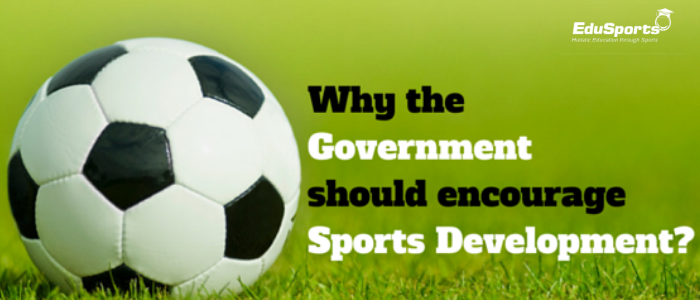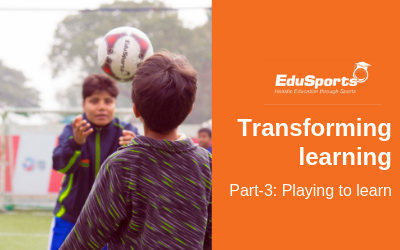“To succeed is to have failed” – learning from failures

Why the Government should encourage Sports Development?
The headline might not have a very simple answer but it is a question worth pondering over. Let’s break the question into smaller parts and try to explore the equation where there is a playful word like ‘sports’ on one side and a serious ‘governance’ on the other.
What is the meaning of ‘sport’ for us? As a dictionary definition of the word – Sport /spɔːt/noun
• It is an activity involving physical exertion and skill in which an individual or team competes against another or others for entertainment.
It is well understood and perceived that sport is a non-serious business. It is entertainment for most of us. It is trivial. In his book ‘The Meaning of Sport’ leading sports journalist Simon Barnes (2006) examines why sport holds us all in such thrall, how it uplifts and crushes us- and can seem to matter more than life itself. We humans, tend to invest our energies and emotions on things that could emulate life. Sport gives us just that, which could be considered as the best metaphor for life. Sports give us the arena to discover the best and worst of us. It teaches us, develops us, and nurtures us as humans on individual levels and as a society at large.
“Sports activities have a positive role to play as ingredients in wider ranging initiatives to address issues of health promotion, diversion of crime, education and employment initiatives and community development and social inclusion..” (Coalter, 2001).
Across the globe, many decision- making bodies have understood that sports can build not just a team but a culture of fitness, discipline, respect, inclusion and acceptance. Hence these bodies are focusing on enabling better opportunities for sports development.
Are benefits of sports development beyond the physical ones? Does it change anything on a larger scale?
Sport not only engages the participants but is also known to have positive effects on the society as a whole. As per Clearinghouse for sport (2015), “A growing body of evidence, suggests, well organized and delivered sport and physical activity programs combined with other targeted interventions can make a contribution in reducing crime within targeted groups and communities.”
Apart from health, fitness and education, which are obviously correlated with sports development, ‘social inclusion’ which leads to ‘higher employment’, ‘economic growth’ and ‘reduction in crime’ are also the positive effects of favourable government policies for sports development.
What are the aspects of sports development that our government can contribute to?
Sports development can broadly mean the following –
> A process whereby effective opportunities, processes, systems and structures are set up and encourages people in all or any particular groups and areas to take part in sport and recreation or to improve their performance to higher levels of proficiency.
> Ensuring the pathways and structures are in place to enable people to learn the basic movement skills, participate in sports of their choice, develop their competence and performance and reach level of excellence (Collins, 2010).
In India, we have just begun the journey towards sports development, yet the changing outlook of the people to sports is commendable. We need our policy makers to take note of the changing times and needs of the country to make favorable policies and develop a favorable environment for sports development.
The story of EduSports and The Government so far…
EduSports has partnered with government schools across India to provide structured curriculum for physical education which is age appropriate and are focussed on overall development of children aided by continuous assessments. These quality programs involve teachers and parents alike, who in return, support the holistic growth of children to foster lifelong healthy living.
Till now we have only scratched the surface, there is a long way to go as we keep adding more government and private schools as our partners. EduSports has reached out to 400+ private schools across 100+ cities making 3.5 Lac+ students healthier and fitter. We are also catching up with government schools at a fast pace; with our presence in 154+ government schools, spread over 4 States (Haryana, Gujarat, Punjab & Maharashtra), 23000+ students are getting healthier bodies and minds (please see the detailed statistics in the image below). EduSports aims to achieve more milestones by reaching out to more schools and children and working closely with government to create healthy students who will build better communities.
Benefits for the nation at large Playing sport at school level is the first baby step to competitions at the highest level, which in turn, will help us improve our standing as a sporting nation, and contribute to economic growth. With the sports industry slowly turning into a new source of national economic growth, it can become an important source of enlarging domestic demands, offering employment positions, and attracting people to become conscious of their health and well being. The journey has just begun…
References:
Barnes, S (2006). The Meaning of Sport. London: Short Books Ltd. Coalter, F (2001) Realising the Potential of Cultural Services: the case for sport, pg. 52. Clearing house of sport, 2015. “Crime reduction and the role of sport,” [Online] Available from: href="https://www.clearinghouseforsport.gov.au/knowledge_base/organised_sport/sport_and_government_policy_objectives/crime_reduction_and_the_role_of_sport">https://www.clearinghouseforsport.gov.au/knowledge_base/organised_sport/sport_and_government_policy_objectives/crime_reduction_and_the_role_of_sport">https://www.clearinghouseforsport.gov.au/knowledge_base/organised_sport/sport_and_government_policy_objectives/crime_reduction_and_the_role_of_sport [Accessed 10 Feb, 2016]. Collins, M. (2010). Examining Sports Development. London and NewYork: Routledge.






